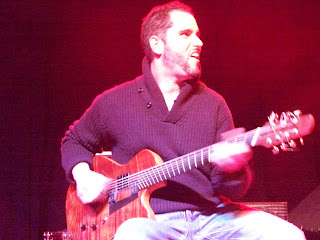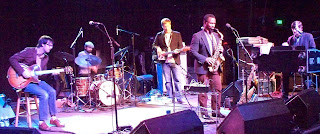If you've never seen Charlie Hunter play live, you're missing out on a chance to blow your mind. He's the kind of player that tortures other musicians, trapping them between incurable jealousy and jaw dropping amazement. But even if you're not a musician, you'll be stunned by what he pulls off with a single instrument. He plays a very special 7 string guitar with 3 bass guitar strings and 4 electric guitar strings. He's built a mind boggling technique of playing both bass lines and chords (or chord melody or leads) all at the same time, more or less independently. This kind of idea isn't so strange; keyboard players do something similar as a matter of course. But the intricacies of making this fit the geometry of the fretboard combined with the complex dual part arrangements make him a true virtuoso. If you just listen, you would assume it's two separate players. That's why you need to see him. I can only apologize that my pictures don't capture this clearly enough.
Charlie's just released a new album, Baboon Strength, and this is the first leg of his tour supporting that album. Last time he came through town, he had a trio. This time it's a quartet with Eric Kalb (drums), Eric Biondo (trumpet) and Cochemea Gastelum (baritone sax). These guys are all very talented and they've each worked with some great names in music. I thought I'd miss the keyboards but the horns added a unique element to the night. I met Eric K. before the show and he talked about being excited to play the first night of this tour for us. The material was still new enough that he spent some of his pre-show time to listen to Baboon Strength again to get ready. Even so, they sounded spot on for the whole night.
When the band came out and got set up, Charlie exclaimed, "I'm ready to sin in the name of music!". This was just an aside, not even on the mike, but the crowd responded. The song kicked off with a fast, angular riff that transitioned into a slower, more open groove. The next song was a nice bluesy number, which was fairly typical for the night. Lots of tight bass lines along with some singing harmonics (bending them, too). With so much of this music improvised, communication between the band is vital. Watching the eye contact, nods, and signals was a lesson in how to manage this.
 The freshness of the material was reflected in the set list. At least a couple of songs were just built on the fly with a quick call like, "Follow me. Dm." Overall, there were a lot of blues
The freshness of the material was reflected in the set list. At least a couple of songs were just built on the fly with a quick call like, "Follow me. Dm." Overall, there were a lot of bluessongs but there were still some reflective, slow jazz numbers, where the trumpet and sax could really get expressive. There were also some more upbeat funk and jam songs. I recognized some of the material from his last album, Mistico. One of these, Spoken Word, was one of the zaniest moments in the show. The song has this insistent riff that builds and then drops out leaving space for a drum solo. Then it ends with a count off back into the riff -- sort of "lather, rinse, repeat". Eric K milked this for all he could get. The first solo was pretty normal but the second started out incredibly spare with barely a hit or two. Then he erupted. During another solo section, Eric was playing in an odd time signature, getting more and more out there. He called out to the crowd, "Keep Dancing!" Right. Then, one, two, three, four... and back in.
My favorite part of the second set was a track off the new disk called Abadaba. This was a moody song with the horns providing a hint of a carnival sound. Maybe a little bit of Oingo Boingo in there. As the intensity grew into a funk vibe, Charlie called out, "We are so dirty!" They threw in a little reference to Suzanne Vega's Tom's Diner at the end and it even made musical sense somehow. A close second moment was his version of Johnny Cash's Folsom Prison Blues. Charlie drove through that tune and didn't look back for a second.
Throughout the night, Charlie and the band were having all kinds of fun. Charlie grimaced, laughed, and mugged for the audience (now I understand "white man's overbite;-).
The encore was a solo blues tune without the band, which let Charlie strut his stuff. It was a great ending.
In the course of the evening, I had an epiphany that shifted my thinking about Charlie. I've always thought of him as a talented guitarist who happens to play bass at the same time. Tonight flipped that on its ear: he's a brilliant bassist who can play guitar at the same time. The difference was clear watching him work with the band. As a bass player, he pulled the grooves together with the drums, coaxing the beat into position. Then, he'd turn and swap bass riffs with the baritone sax, where each would fill the other's musical spaces. Even though he was maintaining his chording or his leads at the same time, he was always thinking like a bass player. I've come to believe that's the key to understanding his approach.
What a night. Pour me some bourbon on the rocks and let's just sit back in awe.

















